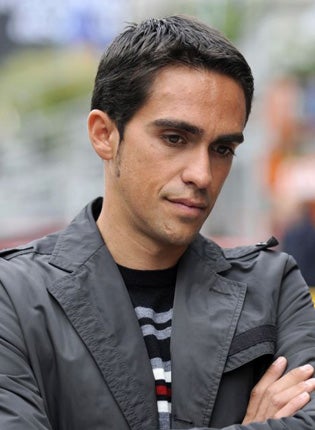Cycling: UCI confirms Contador to face doping inquiry

Cycling's star rider, Alberto Contador, will face disciplinary proceedings over his positive test during the last Tour de France for minute traces of the banned substance clenbuterol, the governing body, the UCI, said yesterday.
The announcement is the first important development in the Contador case since it was leaked by the German media two months ago that the winner of three of the last four Tours de France had tested positive for the anabolic agent.
Since then, Contador has ferociously proclaimed his innocence, arguing that the 0.05 nanograms of clenbuterol found in his system – 40 times less than the minimum required for an anti-doping lab to be able to detect – was only present in two urine samples because of a contaminated steak, which he had eaten shortly before being tested.
Contador tested positive for clenbuterol on the race's second rest day. He eventually won the Tour by a mere 39 seconds, the tightest margin of his five Grand Tour wins.
While scientific experts are divided on the strength of the Spaniard's defence, the UCI's announcement means that after a six-week delay, Contador's case will now go before the Spanish Cycling Federation (SCF) – as national authorities are responsible for prosecuting doping cases – and a definitive verdict will be reached.
It has emerged that the reason for the considerable wait for what is usually a mere formality – handing over the case to a rider's national federation – is that the UCI has been in lengthy discussions with the World Anti-Doping Agency (Wada) about the Contador affair.
"For additional safety, considering the very low concentration [of clenbuterol] detected, the UCI continued scientific investigations in collaboration with Wada," the UCI said. "In particular, it conducted a series of new analyses on all the blood and urine samples taken from the rider in the period in question. Until the end of the proceedings and despite his provisional suspension, Contador still benefits from a presumption of innocence."
Contador's spokesman, Jacinto Vidarte, said the rider had anticipated this announcement. "It's a normal part of proceedings and it's what we've been expecting to happen," Vidarte told The Independent, before denying that the news meant the UCI might feel there were sufficient grounds for a conviction.
"All cases are treated like this and in any case it's now up to the SCF to decide whether Contador's innocent or not.
"In any case, Alberto has absolutely nothing to say until the entire process is decided."
If Contador is found guilty, he could be banned from cycling for up to two years and would lose his third Tour de France title. It would also be the umpteenth blow for a sport whose reputation is already heavily tarnished following a seemingly endless series of doping scandals involving its major figures.
Join our commenting forum
Join thought-provoking conversations, follow other Independent readers and see their replies
Comments
Bookmark popover
Removed from bookmarks